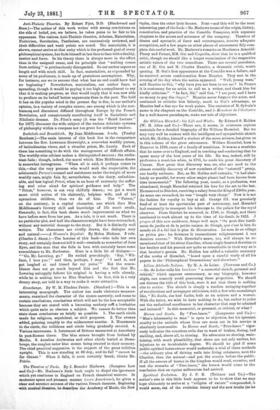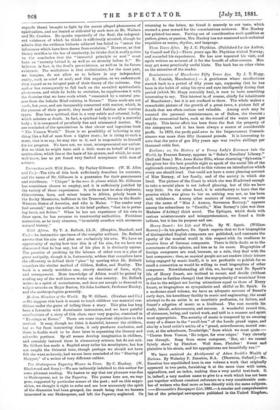hope ultimately to arrive at a "religion of nature" compounded,
it would seem, out of the evolution theory and the new truths (so he
regards them) brought to light by the recent alleged phenomena of spiritualism, and not denied or ridiculed by such men as Mr. Wallace and Mr. Crooke& He speaks repeatedly of the Soul, the independ- ent existence of which he thinks is sufficiently attested, though he admits that the evidence hitherto adduced has failed to "arrest the inferences which have been drawn from evolution." However, as that theory testifies to the law of continuity, he thinks that it really points to the conclusion that the "immortal principle or soul" must have an "eternity behind it, as well as an eternity before it." He believes, in fact, in the Soul's pre-existence, as well as in its future existence. The misfortune is that evolutionists, for the most part, we imagine, do not allow us to believe in any independent entity, such as mind or soul; and this negation, as we understand, they regard as an integral part of their theory of the universe. Our author has consequently to fall back on the so-called spiritualistic phenomena, and while he holds to evolution, he supplements it with the doctrine that we have souls which "emanated by a natural pro- cess from the Infinite Mind existing in Nature." These souls are not made, but grow, and are inseparably connected with matter, which, in the process of their growth, they mould and fashion after various types. Man has a spiritual, that is, a very subtle and ethereal, body, which subsists at death. In fact, a spiritual body is really a material body ; it is composed of peculiarly fine and attenuated matter. We are reminded of the speculations in that clever and ingenious book "The Unseen World." There is no possibility of believing in any thing like a fall of man from a higher state;, he is rising to such a state, that is to say, be may rise to it, and is responsible to himself for his progress. We have not, we trust, misrepresented our author. Bat we think be might have said a little more on behalf of his pet spiritualism, which lies at the basis of his system, and which, he must well know, has as yet found very limited acceptance with men of science.



































 Previous page
Previous page